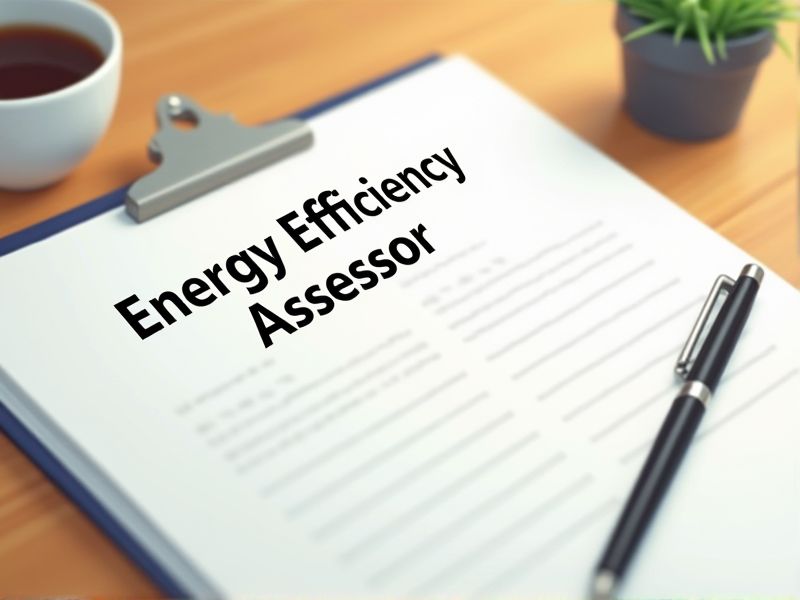
Energy efficiency assessors play a crucial role in evaluating and improving energy use in buildings, impacting both environmental sustainability and cost savings. Given the technical nature and regulatory standards associated with energy assessments, having specific certifications ensures that assessors possess the necessary expertise and credibility. These certifications validate an assessor's ability to analyze energy systems, recommend improvements, and comply with local and national efficiency standards. Here are some key certifications you might need as an energy efficiency assessor.
Certified Energy Manager (CEM)
The role of a Certified Energy Manager (CEM) is crucial for an Energy Efficiency Assessor because they possess comprehensive knowledge of energy systems and optimization techniques. Their certification ensures they are capable of identifying inefficiencies and implementing energy-saving measures effectively. Being certified also instills confidence in stakeholders, as it demonstrates a recognized level of expertise and commitment to industry standards. The presence of a CEM can lead to more accurate assessments and impactful energy reduction strategies, driving cost savings and sustainability goals.
Certified Energy Auditor (CEA)
Certified Energy Auditors bring specialized knowledge in identifying energy-saving opportunities, directly impacting an organization's cost efficiency. Their expertise in assessing energy consumption patterns allows for precise recommendations leading to reduced energy waste. By employing CEAs, organizations can ensure compliance with regulatory standards, minimizing potential legal and financial ramifications. Possessing a CEA credential signifies credibility and trust, increasing the likelihood of successful implementation of energy efficiency initiatives.
LEED Green Associate
The LEED Green Associate credential equips professionals with a comprehensive understanding of sustainable practices, essential for accurately assessing energy efficiency. This qualification highlights a commitment to environmental standards, boosting credibility in the industry. It serves as a guide to identify inefficiencies and propose effective strategies for energy conservation. Possessing this certification often leads to improved career opportunities in green building sectors.
LEED Accredited Professional (AP)
LEED Accredited Professionals have specialized knowledge that helps identify and implement sustainable practices in building projects. Their expertise ensures that projects meet rigorous standards for energy efficiency, leading to reduced environmental impact. By understanding LEED criteria, these professionals enhance the credibility and success rate of green certification pursuits. Their role has become critical as more stakeholders prioritize energy efficiency and sustainability in construction.
BREEAM Assessor Certification
Achieving BREEAM Assessor Certification equips professionals with the skills to measure and verify the environmental impact of buildings. This certification facilitates the identification of energy-saving opportunities, thus promoting sustainable design and resource efficiency. As clients increasingly demand eco-friendly projects, having this certification enhances the credibility and marketability of an energy efficiency assessor. The credentials also ensure assessors remain informed on the latest industry standards and best practices.
Certified Home Energy Professional (CHEP)
A Certified Home Energy Professional (CHEP) is needed for Energy Efficiency Assessors because they provide a standardized approach to evaluating home energy performance. CHEPs ensure accuracy in assessments, leading to more reliable energy-saving recommendations. This certification enhances trust among homeowners seeking to reduce energy costs through verified expertise. The presence of a CHEP can result in improved energy efficiency ratings and increased property value.
Building Performance Institute (BPI) Certification
BPI Certification ensures that an Energy Efficiency Assessor possesses the necessary skills and knowledge to accurately evaluate building systems. This certification leads to improved energy efficiency outcomes because certified assessors adhere to established industry standards. It also enhances an assessor's professional credibility, making them more attractive to potential employers and clients. BPI Certification facilitates access to specialized tools and resources, enabling assessors to stay updated on the latest advancements in energy efficiency.
Passive House Consultant Certification
Becoming a Passive House Consultant is essential for energy efficiency assessors because it enables them to apply rigorous energy-saving standards in building design. The certification equips assessors with the skills to minimize energy consumption, which is crucial in reducing a building's carbon footprint. By understanding advanced building performance metrics, these consultants can make informed decisions that contribute to sustainable development. The certification reinforces an assessor's credibility by aligning their expertise with internationally recognized energy efficiency standards.
HERS Rater Certification
HERS Rater Certification ensures that energy efficiency assessors have the specific skills and knowledge required to evaluate home energy performance accurately. This certification provides a standardized approach, offering credibility and consistency in energy assessments. By having certified HERS Raters, homeowners and builders can trust that energy efficiency recommendations are based on recognized methods. The certification helps in meeting compliance with government energy efficiency programs, thereby facilitating potential incentives or rebates.
Energy Efficiency Practitioner Certification
Certifying Energy Efficiency Assessors ensures they possess standardized knowledge, which enhances the accuracy and reliability of energy evaluations. Certified practitioners are more likely to identify and implement cost-effective energy-saving measures, benefiting both consumers and the environment. As energy regulations become increasingly complex, certification helps assessors stay updated with the latest standards and technologies. The certification process fosters a competitive advantage for practitioners, signaling expertise and commitment to potential clients.
Summary
When you receive certifications as an Energy Efficiency Assessor, your credibility and professional standing are likely to increase, leading to an expanded client base. Your ability to perform comprehensive and accurate assessments should improve, which can enhance client satisfaction and trust. Certified assessors generally have better access to industry resources and updates, facilitating informed decision-making. With certifications, potential earnings often rise, reflecting higher demand for expert services.
